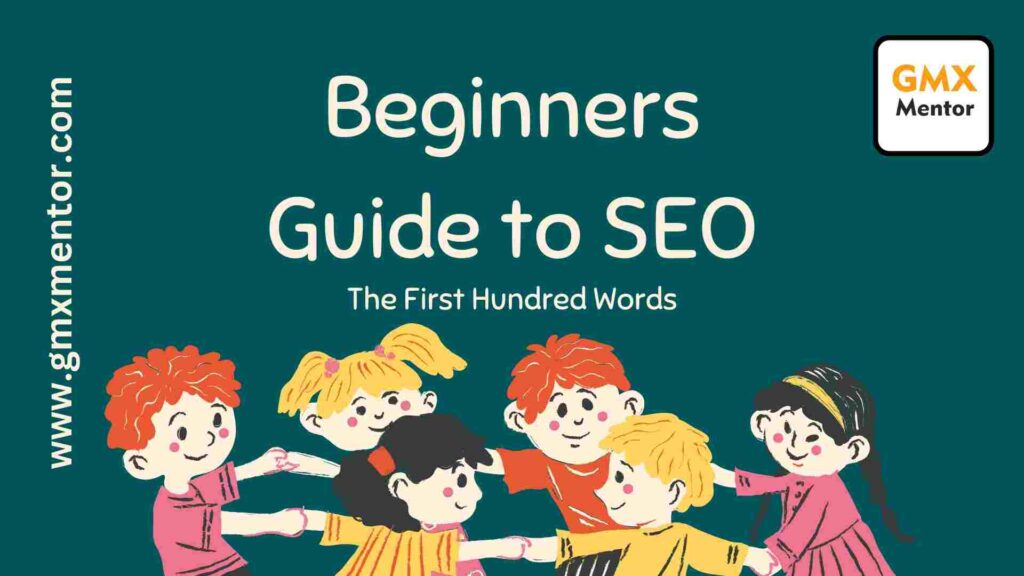Introduction to SEO
In today’s article “Beginners Guide to SEO”, Search Engine Optimization (SEO) has become crucial for anyone who is looking to create a strong online presence. Whether you are handling a blog, e-commerce store, or business website, SEO can surely impact your visibility, traffic, and, finally, your success.
This is the Table of Contents You Can Go to Any Part of the Post just by Clicking Here.
What is SEO?
In Beginners Guide to SEO, I can tell you! SEO is a process that improves your website visibility on search engines like Google, Bing, and Yahoo. It includes optimizing your website content, structure, and links so the search engines can easily index and rank it. In essence, SEO helps make your website more attractive to search engines, increasing the likelihood that your site will appear higher in search results.

Why SEO is Essential for Online Success
Beginners Guide to SEO, Without SEO, even the best-designed website can struggle to gain visitors. SEO ensures that your target audience can find you. Organic search results earned through SEO are considered more trustworthy and are clicked more often than paid advertisements. Mastering SEO provides a sustainable way to grow your online visibility and drive long-term traffic to your website.
How Search Engines Work
Beginners Guide to SEO, To understand SEO, you must understand how search engines function.
Crawling, Indexing, and Ranking
Search engines use automated bots, which are crawlers, to explore websites from the whole internet. They analyze content, follow links, and compile data on each site they visit. This process is known as crawling. After crawling, the information is stored in a database—a process called indexing. When users enter a search query, the search engine retrieves the most relevant results from its index, ranking them based on numerous factors.
The Role of Algorithms
Search engine algorithms are complex systems that determine the order in which websites are displayed in search results. Google, for example, uses over 200 ranking factors to decide which pages are most relevant to the search query. These factors include keyword usage, website structure, backlinks, and user experience. Beginners Guide to SEO
On-Page SEO Basics
On-page SEO refers to optimizing elements on your website to improve its ranking. Beginners Guide to SEO
Keyword Research: Finding the Right Terms
Keywords are the foundation of SEO. Start by researching which words and phrases your audience is likely to search for. Tools like Google Keyword Planner can help you identify high-traffic keywords related to your niche. Beginners Guide to SEO
Meta Tags: Titles, Descriptions, and Headings
Meta tags, such as title tags and meta descriptions, are HTML elements that tell search engines what your page is about. Make sure these tags include your target keywords while also providing a clear and compelling reason for users to click through to your page. Beginners Guide to SEO
Content Optimization: Quality, Length, and Relevance
High-quality, relevant content is one of the most important ranking factors. Search engines favor content that provides real value to users. Aim for comprehensive content, typically 1,000 words or more, while also ensuring your information is up-to-date and informative. Beginners Guide to SEO
Internal Linking: Why It’s Important
Internal linking—adding links from one page of your website to another page. This helps search engines understand your site’s structure and content. It also keeps visitors on your site longer, which can improve rankings.
Image SEO: Alt Text, File Size, and Descriptions
Search engines can’t “see” images, but they can read alt text. Be sure to include descriptive alt text for all images, and compress file sizes to ensure fast loading times. This improves user experience and boosts your SEO.
Off-Page SEO Essentials
While on-page SEO focuses on your website, off-page SEO is all about building authority and credibility through external factors.
What is Off-Page SEO?
Off-page SEO involves actions taken outside your website to improve its search engine ranking. It includes backlinks, social media engagement, and influencer outreach.
The Importance of Backlinks
Backlinks are links from other websites to your website, and this is one of the most important off-page SEO points. Search engines view backlinks as a sign of trust and authority. The more high-quality backlinks your website has, the more chances you are going to rank higher in search results.
How to Build Quality Backlinks
To build quality backlinks, focus on creating shareable, valuable content. Guest posting on reputable blogs, collaborating with influencers, and engaging in relevant online communities can also help attract backlinks.
Social Media Signals and Their Impact on SEO
Although not a direct ranking factor, social media signals can indirectly influence your SEO by driving traffic to your site and increasing brand awareness. Regularly share your content on social platforms and engage with your audience to enhance your off-page SEO efforts.
Technical SEO Fundamentals
Technical SEO refers to optimizing your website for crawling and indexing by search engines.
Website Speed and Performance Optimization
Fast-loading websites rank higher on search engines and offer a better user experience. Compress images, use browser caching, and minimize redirects to improve your site speed.
Mobile-First Indexing: The Importance of Mobile SEO
With Google’s mobile-first indexing, your website’s mobile version is the primary focus for rankings. Make sure your website is mobile friendly responsive and gives a good experience on all devices.
Securing Your Website: HTTPS and SSL Certificates
Security is also a very important ranking factor. Use HTTPS encryption, secured through SSL certificates, to protect user data and improve your rankings.
XML Sitemaps: How to Create and Submit One
An XML sitemap helps search engines understand the structure of your site. Submit your sitemap to Google Search Console to ensure your pages are crawled and indexed. Beginners Guide to SEO
Robots.txt: Managing Search Engine Crawlers
The robots.txt file allows you to manage which parts of your site search engines can crawl. Make sure to use it wisely, ensuring all essential pages are open for crawling. Beginners Guide to SEO
Understanding SEO Analytics
To track your SEO progress, you need to understand analytics. Beginners Guide to SEO
Using Google Analytics to Track Performance
Google Analytics allows you to monitor site traffic, user behavior, and more. By analyzing this data, you can identify areas that need improvement.
Google Search Console: Key Features and Tools
Google Search Console offers insights into how your site performs in search results. It helps you monitor search queries, crawl errors, and more. Beginners Guide to SEO
Key Metrics to Monitor: Traffic, Bounce Rate, CTR, and More
Keep an eye on key metrics like traffic, bounce rate, and click-through rate (CTR) to understand how users interact with your site and where you can make improvements. Beginners Guide to SEO
Common SEO Mistakes to Avoid
Some SEO mistakes can severely impact your ranking. Beginners Guide to SEO
Keyword Stuffing
Keyword stuffing—overloading your content with keywords—can lead to penalties. Instead, focus on natural and relevant keyword usage.
Ignoring Mobile Optimization
With the majority of web traffic now coming from mobile devices, failing to optimize for mobile can hurt your rankings.
Using Low-Quality Backlinks
Not all backlinks are equal. Low-quality or spammy backlinks can lead to penalties, so focus on earning links from reputable sources.
Tools for SEO Success
SEO tools can simplify your efforts.
Best Free and Paid SEO Tools (Google Keyword Planner, Ahrefs, Moz, etc.)
Tools like Google Keyword Planner, Ahrefs, and Moz offer insights into keyword rankings, backlinks, and competitor analysis. Beginners Guide to SEO
How to Use SEO Tools Effectively
To get the most out of SEO tools, regularly monitor your site’s performance and adjust your strategies accordingly.
SEO Best Practices for 2024 and Beyond
SEO is constantly evolving.
Voice Search Optimization
With the rise of voice search, optimizing for conversational keywords and long-tail search queries is becoming increasingly important.
User Experience (UX) and SEO
User experience is a major ranking factor. A well-designed, easy-to-navigate website will not only rank better but also retain visitors longer.
The Future of AI in SEO
AI technologies like Google’s RankBrain are transforming SEO. Machine learning and AI are being used to better understand search intent, so it’s essential to optimize for user-focused content.
Conclusion
SEO is a long-term strategy that requires ongoing effort. While it can take time to see results, the payoff in terms of increased traffic and visibility is well worth it. By mastering the basics of on-page, off-page, and technical SEO, you can build a strong foundation for your website’s success.
Take the next step today by implementing the SEO strategies discussed in this guide!
Here are some frequently asked questions (FAQs) for the article titled “The Ultimate Beginner’s Guide to SEO: What You Need to Know”:
1. What is SEO, and why is it important?
SEO, or Search Engine Optimization, is a process of optimizing your website to rank higher on search engine result pages (SERPs). It is important because it helps increase organic traffic to your site, making it more visible to potential customers or users.
2. What are the key components of SEO?
The key components of SEO include:
- On-page SEO (content, keywords, meta tags)
- Off-page SEO (backlinks, social signals)
- Technical SEO (site speed, mobile-friendliness, security)
3. How do search engines work?
Search engines like Google use bots to crawl websites, index the content, and rank them based on algorithms. The process involves crawling, indexing, and ranking based on relevance, authority, and user experience.
4. What is the difference between on-page and off-page SEO?
On-page SEO means the optimization will be directly on your website, including keyword research, meta tags, and content optimization. Off-page SEO focuses on external factors like backlinks and social media signals that impact your website’s authority.
5. What is keyword research, and why is it important?
Keyword research involves finding relevant search terms that users type into search engines. It’s important because using the right keywords helps you target the right audience and improves your chances of ranking higher on SERPs.
6. How can I build high-quality backlinks?
You can build high-quality backlinks by:
- Guest blogging on reputable sites
- Creating high-quality content that others want to link to
- Reaching out to influencers and industry leaders for collaboration
7. What is the role of mobile SEO in rankings?
Mobile SEO focuses on optimizing your website for mobile devices. Since Google has moved to mobile-first indexing, having a mobile-friendly site is critical for ranking higher in search results.
8. What tools can I use for SEO?
Popular SEO tools include Google Keyword Planner, Ahrefs, Moz, SEMrush, and Google Search Console. These tools help with keyword research, backlink analysis, and performance tracking.
9. What are common SEO mistakes to avoid?
Common SEO mistakes include:
- Keyword stuffing
- Neglecting mobile optimization
- Using low-quality or spammy backlinks
10. How can I track my SEO performance?
You can track SEO performance using tools like Google Analytics and Google Search Console. Key metrics to monitor include organic traffic, bounce rate, click-through rate (CTR), and keyword rankings.
Follow Us On Social: Facebook
Web Hosting Companies: Choose the Right Web Hosting Company
Using Keywords in Page Titles: Guide to Boosting SEO Rankings



